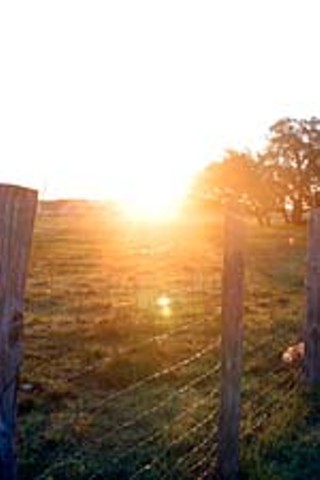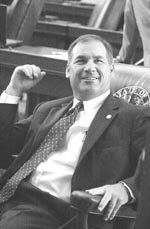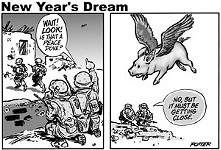Sunset vs. Goliath
Tiny Sunset Valley defends the aquifer -- but could use a little neighborly help
By Amy Smith, Fri., Oct. 10, 2003

Sunset Valley Mayor Terry Cowan climbs into his vintage '79 Ford Bronco and rumbles out of the City Hall parking lot onto Jones Road. We crank down the windows and set off on a tour of this little speck of a town, where donkeys and goats are as much a part of the local culture as Circuit City or Old Navy. This rural-meets-retail study in small-town life is contained within a single square mile, roughly 700 acres, now surrounded on all sides by Southwest Austin, which steadily grew around Sunset Valley over the last couple of decades.
Heading west on Jones, Cowan points out some of the city's more progressive features: the $1 million green-builder project under way for a new City Hall and rain-reclamation system, a community organic garden, a traffic-calming circle ("This took four years of dialogue"), wide bicycle lanes, and pedestrian trails that wend through much of the city's 200 acres of open space.
And there are the less appealing aspects, too, such as the ill-favored Toney Burger Activity Center -- a hulky sporting events and bus depot complex that Austin ISD dumped on Sunset Valley in 1976, after a rough-and-tumble eminent domain dispute that the city battled all the way to the Texas Supreme Court.
"I know we're just a little town, but we're used to fighting long odds," the three-term mayor explains of the city's scrappy, litigious history. "We will fight for our neighborhoods, and we will fight for our city -- and we don't care how big the Goliath is."

Cowan steers the heavy Bronco toward Brodie Lane and turns south into the late-afternoon traffic, gliding past two large shopping centers -- the financial lifeblood of the community. These commercial developments may look like any other strip of chain stores, but not every town of 400 can lay claim to $3 million in annual sales-tax revenue -- $4 million in a good year. Sunset Valley passed the windfall directly on to its residents and business owners in 1995 by abolishing city property taxes.
The pot of gold has also enabled the city to hire attorneys and environmental consultants so that the citizens -- not outside developers -- can guide their own destiny. A fundamental concern is that most of the town sits atop the sensitive recharge zone of the Edwards Aquifer, which in this community is not only an environmental symbol but the sole source of water for 80% of the residents.
As the town's volunteer mayor and council members have learned over the years, all that glitters is not community gold along Brodie Lane's commercial strip. Cowan slows a bit as we reach the southern edge of Valley Market Fair, a 13-year-old shopping center and the first commercial development of its kind in Sunset Valley. "This," Cowan says, pointing to a shuttered building and vacant parking lot, "is our empty big box."
The vacant shell is local evidence of a national trend among big-box retailers -- trading existing boxes for even bigger ones. That's what happened in the case of Home Depot, which expanded onto adjacent property behind the now-empty store. The grandfathered land rights attached to the new site left Sunset Valley with few options in regulating the development, but Home Depot did agree to a number of concessions during the process, Cowan says. "It could have been worse." The concessions did little to resolve the empty-box syndrome, however. Home Depot had originally planned to convert the vacant building to a design expo center, but then scrapped those plans indefinitely.
Cowan continues down Brodie and within seconds comes across Sunset Valley's current battlefield -- a wide swath of largely undeveloped land owned by Eli Garza, whose family farmed the property for 80 years. This 30-acre tract is where Wilkesboro, N.C.-based Lowe's Companies Inc. wants to plant a 162,000-square-foot home improvement warehouse and go head-to-head with Home Depot, its biggest competitor.

Caught in the Trade Wars
The prospect of another big box landing in Sunset Valley prompted city officials to take drastic action one night last fall. In a special-called meeting on Nov. 4, 2002, the City Council voted to release the Garza property and another nearby tract to the city of Austin. At the time, Sunset Valley's impervious-cover rules stood at 40% for commercial developments (since changed to 18%), and the logic held that the property would be better served by Austin's Save Our Springs Ordinance, which in the recharge zone carries a 15% impervious cover cap.
Local developers and property rights advocates criticize Sunset Valley's action as brazen, foolhardy, or just plain arrogant, but Mayor Pro Tem Cat Quintanilla sees things differently. "We're fighting to protect our community's rights," she says. "There were those of us who cried the night we released the land. What's really absurd," she adds, "is that there is this corporate battle going on between these two businesses, and that puts us at risk."
As it happened, Lowe's had filed its preliminary application with Sunset Valley the morning of Nov. 4 -- some seven hours before the council acted on the land release. Lowe's representatives argued that their development rights should be grandfathered because they had an application pending before the council took action. But the application had been rejected because it was incomplete, said Deputy City Administrator Jayme Foley. As Foley later explained: "When [someone] comes in with paper and a check, that doesn't mean they have a project."
So Lowe's Austin attorney, Terry Irion, filed the preliminary plan with the city of Austin. "The one thing I was clear on," Irion says, "was that we were no longer in [Sunset Valley's] jurisdiction. I wasn't sure if we were in Austin's, but I filed the application with Austin." Irion continues, "We had no idea that they were trying to release this property, but our rights were attached on Monday morning, November 4, 2002." What Sunset Valley did, Irion says, "was just wrong." But Austin, like Sunset Valley, also deemed the Lowe's development application incomplete and rejected it. Lowe's responded with a lawsuit.
In ceding the property to Austin, Sunset Valley officials assumed that its neighbor to the north would enforce its own SOS Ordinance. They may have overestimated Austin's willingness to fight a land-use battle over the aquifer, particularly when the Legislature was in session. Facing both the threat of a lawsuit and the unpredictable nature of the Lege, Austin city staff and outside counsel Casey Dobson decided it was time to bring Lowe's to the bargaining table.

Once that happened, Sunset Valley officials and environmental activists feared the worst. For even while they continued talking with the city, Lowe's and landowner Garza's representatives -- including Irion, former Mayor Bruce Todd, lobbyist Chris Shields, and attorney Dan Wheelus -- nonetheless pursued their case through the Legislature.
Is the City Boxed In?
Initially, House Bill 1204, authored by Austin Rep. Todd Baxter and carried in the Senate by Jeff Wentworth (whose San Antonio-based district includes Sunset Valley), contained fairly innocuous language that called on cities and counties to streamline their development regulations in extraterritorial jurisdictions. But Lowe's and Garza's cadre of hired guns successfully lobbied for additional language that, in their estimation, places the Lowe's project solely under the authority of Travis Co., which has few development restrictions and no water-quality regulations (see "Lowe's, Austin, and HB 1204," above).
It appears that Dobson, the city's lawyer, may agree with Lowe's interpretation of the bill -- or at least doesn't want to put the city at risk on an iffy case -- and is giving Lowe's the benefit of the doubt. The two sides are now putting the final touches on a draft settlement agreement that would give Lowe's 40% impervious cover and give Austin some mitigation land -- possibly in a different watershed and miles from Sunset Valley. "The settlement agreement hedges the city's bet that we might be right about not being in the city's jurisdiction," Irion says.
Brad Rockwell, an attorney and deputy director of the Save Our Springs Alliance, argues that the new state law does not affect the SOS Ordinance because Lowe's had not filed a valid plat application. He is particularly perplexed why, at the opening of negotiations, Dobson readily agreed to Lowe's originally proposed 40% impervious cover. Dobson points out that the City Council has the final word on the settlement and, although the issue has been discussed in executive sessions, it's uncertain when, or if, the council will take action on a proposed agreement. As of a few weeks ago, a majority of council members appeared to be dead set against a Lowe's deal, but that sentiment may be shifting slightly.
Council Member Brewster McCracken, who included among his Place 5 campaign themes no big-box development on the aquifer, says he expects council will vote on an agreement within a few weeks. Choosing his words carefully, McCracken says that in this particular case the city may have few choices. "I do not believe we should be putting big boxes over the aquifer," he said, "but the huge hurdle that we face here is, what are the city's best legal options? Based on the legal advice that we're getting, [Lowe's] is going to end up in that location no matter what we do."
Taking a longer view, McCracken says, "Two issues that we're considering are: How do we address this proliferation of big boxes, and how do we control their development over the aquifer? The city needs to do two things: pursue new zoning laws that would control big boxes over the aquifer, and enact a new development classification for big boxes in other areas of the city."
Defining Moments
The prospect of a Lowe's warehouse on Brodie Lane has also drawn an unlikely critic from the sidelines. Bill Walters, an Austin developer with a 10-year history in Sunset Valley (much of it spent in litigation) squirmed slightly when asked to elaborate on comments he made about the Lowe's project to the Austin Business Journal. He declined to fuel the controversy, but said he stands by his opinion that "aircraft-sized" warehouses are not compatible with communities like Sunset Valley and added, "In my opinion, those types of developments belong on I-35, or 290, or 183."

Walters' own development project -- a unique master plan of retail and residential projects -- involves about 300 acres of the old Weaver ranch. Dr. John Weaver ("Doc Weaver," as he's called in these parts) and his wife Charlotte settled in Sunset Valley in 1945 -- nine years before the city incorporated -- and still occupy the homestead portion of the ranch. The farmhouse and a lovely Pennsylvania Dutch barn, along with the resident donkeys, strike an odd juxtaposition against the backdrop of a major highway, a shopping center, and a gridlocked intersection at Brodie and U.S. 290.
Walters has already developed much of the property; the Sunset Valley Village retail center is home to a number of national chains, including Barnes & Noble and World Market. Down the road, Sunset Valley Meadows, a new neighborhood of single-family homes on large lots, offers a pastoral setting tucked off a long, winding street that leads to Brodie. More than 100 acres of the Weaver property was dedicated to the city for conservation and right-of-way purposes.
Cowan, of course, keeps a close eye on Walters' ongoing development. After years of legal wrangling and a settlement agreement, Walters and Sunset Valley officials have eased into a better working relationship, with the chief understanding being that they'll agree to disagree. "We have worked together very well at times," Walter says, "and not so well at other times."
Cat Quintanilla, the mayor pro tem, agrees with that assessment. "It's been contentious at times, but I think we've been able to settle into a working relationship." Quintanilla, one of the more outspoken officeholders in Sunset Valley, says her background -- growing up on Rainey Street on the eastern edge of downtown Austin -- helped form her passion for protecting and preserving community rights. In the Seventies, land speculators began sniffing out Rainey Street as a possible site for the Convention Center or some other type of development.
In the mid-Eighties, her parents finally agreed to sell their home at 51 Rainey to a real estate broker with big dreams. He paid about two-thirds of the money owed, with the promise of more -- and then went bankrupt in the real estate bust. "My dad was basically left empty-handed," she says. The family home has since been demolished. "I think that experience gave me my sense of fearlessness." That experience also led her, with her husband and children, to Sunset Valley in 1986, where they built their home on a lush, expansive piece of property. Cisco the donkey makes his home out back ("He's our organic fertilizer facilitator"), along with a brood of bard rock chickens, two dogs, two guinea pigs, and a cat.
Like many of the locals, Mayor Cowan also moved here from his hometown of Austin. What he was searching for -- a participatory democracy -- he found in Sunset Valley, a city that grew up holding its City Council meetings over pie and coffee at somebody's house. Before the shopping centers started fattening the city's coffers, city leaders and residents would do their own street repairs. These "pothole parties" were community events. Cowan is now exploring ways to diversify this predominantly white, middle- to upper-middle-class community because, he says, "We don't have enough notes in our orchestra."
For now, though, the mayor's focus is on how Austin is going to handle the Lowe's issue. "We gave Austin 10 percent of our town to protect our drinking water," Cowan says. Even if Austin and Lowe's are able to broker a deal that allows the retailer to proceed, that won't be the end of it, Cowan vows. Sunset Valley has buttressed its war chest this year with nearly $400,000 for litigation matters. "We're prepared to spend time and money to fight this thing because the Lowe's case could be the template for all the other big boxes to come over the aquifer," he says. "This is the defining moment -- where Austin decides whether it's going to sell out or not." ![]()
Got something to say on the subject? Send a letter to the editor.










